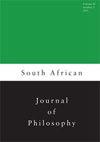关于人际暴力与暴力无力的思考
IF 0.2
3区 哲学
0 PHILOSOPHY
引用次数: 0
摘要
我们认为,暴力问题在一定程度上持续存在,是因为我们拒绝或无法系统地思考创伤、困难或“毫无意义”的材料。我们探讨了思维与暴力之间的联系,特别是阿伦特关于思维是否能使人放弃暴力的问题。我们感兴趣的是知道和不知道之间的关系和紧张关系——作为思维的产物——与暴力(以及我们自己的暴力能力)有关。紧张主要表现在两个方面。首先,思维被用来揭示黑暗或难以理解的材料,从而增加我们对自己、我们在动荡社会中的地位以及我们与暴力的关系的了解。其次,思考会阻碍我们的认知能力,正是这种不可知性使我们暴露在思考的极限,以及谦逊和相互脆弱的地方。我们建议,更密切、更细致地关注上述问题的性别层面,可以揭示基于性别的暴力持续存在的重要原因。与阿伦特一样,我们认为暴力是不掌握的结果,男性权力与暴力的等式是一个谎言,暴力本身就存在。同样,Heberle认为,暴力源于男性主体性的脆弱非凝聚力,因此也将暴力的根源追溯到软弱和脆弱,而不是力量或权力。我们认为,这种错误的掌握和控制的解药是思考。本文章由计算机程序翻译,如有差异,请以英文原文为准。
On thinking about interpersonal violence and the impotence of force
We argue that the problem of violence persists, to a certain degree, because of our refusal or inability to think about traumatic, difficult or “senseless” material systematically. We explore the connection between thinking and violence, and specifically Arendt’s question whether thinking can make men abstain from violence. We are interested in the relationship and tension between knowing and not knowing – as products of thinking – in relation to (also our own capacities for) violence. The tension presents in two main ways. First, thinking is employed to shed light on dark or difficult knowable material, thereby increasing our understanding of ourselves, our place in a troubled society and our relation to violence. Second, thinking bumps up against our ability to know, and it is this unknowability that exposes us to our limits as thinking beings as well as a place of humility and mutual vulnerability. We suggest that paying closer and more nuanced attention to the gender dimensions of the above questions reveals something important about the reasons that gender-based violence persists. We argue, with Arendt, that violence results from non-mastery and that the equation of male power with violence is a lie that violence perpetuates about itself. Similarly, Heberle argues that violence results from the fragile non-cohesiveness of masculine subjectivity and thus also traces the roots of violence to weakness and fragility rather than strength or power. We argue that the antidote for this false mastery and control is thinking.
求助全文
通过发布文献求助,成功后即可免费获取论文全文。
去求助
来源期刊

SOUTH AFRICAN JOURNAL OF PHILOSOPHY
PHILOSOPHY-
CiteScore
1.00
自引率
0.00%
发文量
19
期刊介绍:
The South African Journal of Philosophy (SAJP) is the official publication of the Philosophical Society of South Africa. The aim of the journal is to publish original scholarly contributions in all areas of philosophy at an international standard. Contributions are double-blind peer-reviewed and include articles, discussions of articles previously published, review articles and book reviews. The wide scope of the South African Journal of Philosophy makes it the continent''s central vehicle for the publication of general philosophical work. The journal is accredited with the South African Department of Higher Education and Training.
 求助内容:
求助内容: 应助结果提醒方式:
应助结果提醒方式:


